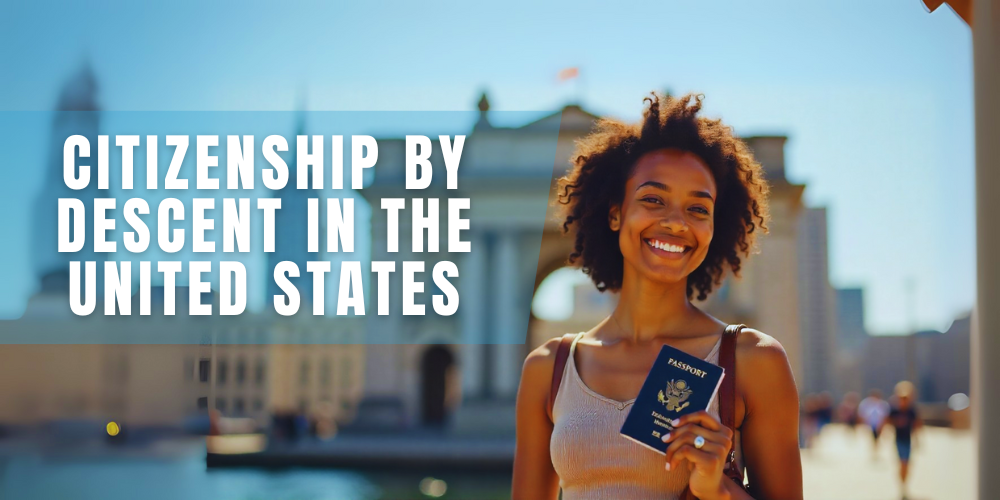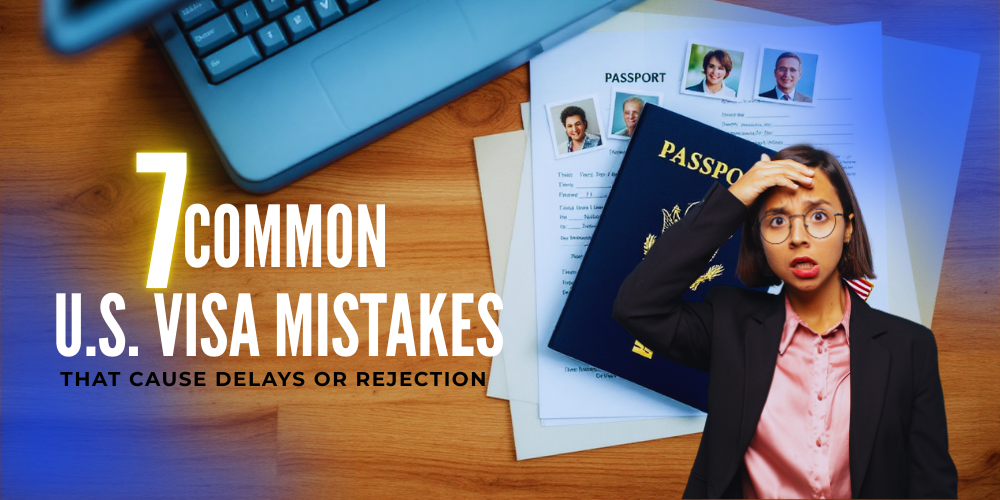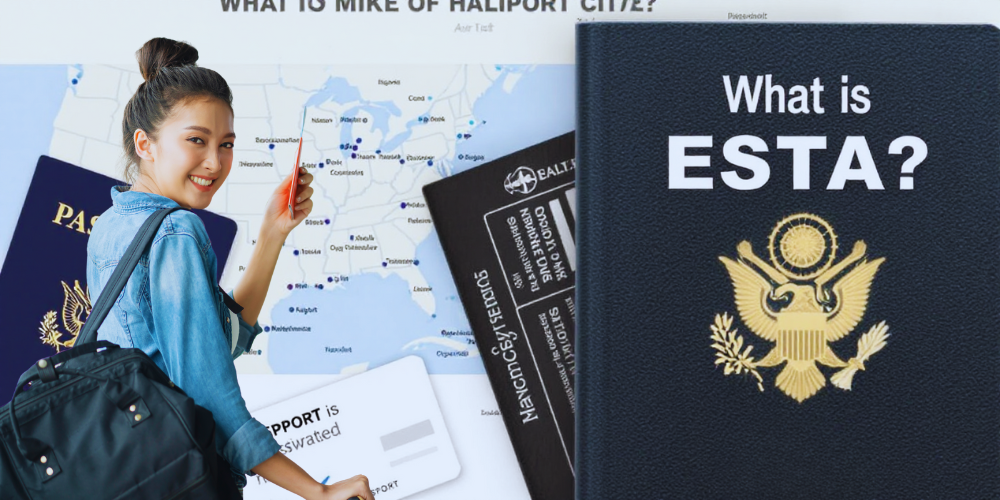--------- Citizenship by Descent in the United States: A Complete Guide
Aug 11, 2025

For many people, the dream of becoming a U.S. citizen doesn’t always start with moving to America. Sometimes, it begins with a family connection — a parent, or even a grandparent, who is a U.S. citizen. This pathway is known as Citizenship by Descent, and it can be a powerful way to establish your American identity without undergoing the traditional immigration process.
This article will explain what U.S. citizenship by descent is, who qualifies, how to apply, and common pitfalls to avoid.
What is Citizenship by Descent?
Citizenship by descent — also called acquisition of citizenship — is the process of becoming a U.S. citizen at birth or after birth through your parents’ citizenship status, rather than through naturalization.
If you are born outside the U.S. but have a parent (or, in some limited cases, a grandparent) who is a U.S. citizen, you might already be a U.S. citizen without knowing it.
Who Qualifies for U.S. Citizenship by Descent?
Eligibility depends on several factors, including:
1. One or Both Parents are U.S. Citizens at Your Birth
- If both parents are U.S. citizens: At least one must have lived in the United States or its territories at any time before your birth.
- If one parent is a U.S. citizen and the other is not: The U.S. citizen parent must meet specific physical presence requirements in the U.S. before your birth (usually 5 years, at least 2 of which were after age 14).
2. Your Birth Circumstances
- You must have been born outside the U.S.
- You must be able to prove the biological or legal relationship to your U.S. citizen parent(s).
3. Adoption Cases
- Adopted children may qualify for citizenship if adoption meets the requirements under the Child Citizenship Act of 2000.
Key Legal Framework
U.S. citizenship by descent is governed primarily by:
- Immigration and Nationality Act (INA) Sections 301 & 309
- Child Citizenship Act of 2000
- Department of State Foreign Affairs Manual (FAM) guidelines
How to Claim Citizenship by Descent
If you believe you qualify, the process usually involves proving your claim rather than applying for citizenship from scratch.
Step 1: Gather Evidence
You’ll need:
- Your foreign birth certificate (with translation if not in English)
- Your U.S. citizen parent’s birth certificate or naturalization certificate
- Marriage certificate of your parents (if applicable)
- Proof of your parents’ physical presence in the U.S. before your birth (school records, tax returns, military records, etc.)
Step 2: Apply for Proof of Citizenship
You can:
- Apply for a Consular Report of Birth Abroad (CRBA) if under age 18 (at a U.S. embassy or consulate)
- Apply for a U.S. Passport as proof of citizenship
- File Form N-600 (Application for Certificate of Citizenship) with USCIS for an official citizenship certificate
Step 3: Attend an Interview (If Required)
Consulates and USCIS may require an interview or additional documentation.
Common Challenges and Mistakes
- Insufficient proof of parents’ U.S. residency — Many cases fail because applicants can’t show the required physical presence.
- Missed deadlines for CRBA — While there’s no age limit to claim citizenship, some documentation is easier to obtain if you apply while still a minor.
- Confusion between citizenship by descent and naturalization — If you didn’t acquire citizenship at birth, you may still be eligible for expedited naturalization.
Advantages of U.S. Citizenship by Descent
- No need to go through the lengthy green card process
- Ability to pass citizenship to your children in the future
- Full rights and benefits of U.S. citizenship, including the right to vote, work, and live in the U.S. without restrictions
FAQs – U.S. Citizenship by Descent
1. What is U.S. citizenship by descent?
U.S. citizenship by descent is when a person is automatically considered a U.S. citizen at birth because one or both of their parents were U.S. citizens at the time of their birth, even if the birth took place outside the United States.
2. Who qualifies for U.S. citizenship by descent?
Qualification depends on:
- At least one parent must be a U.S. citizen at the time of your birth.
- The parent must have met certain U.S. residency or physical presence requirements before your birth.
- Your birth circumstances fit the rules in effect on your date of birth.
3. Does it matter if my U.S. citizen parent was my mother or father?
Yes. In some cases, different laws applied to children born to U.S. citizen mothers versus U.S. citizen fathers, especially before the 1980s. For example, unmarried fathers must usually establish paternity and meet additional requirements.
4. How do I prove U.S. citizenship by descent?
You typically need to submit:
- Proof of your parents’ U.S. citizenship (e.g., U.S. passport, birth certificate, naturalization certificate).
- Evidence of your parent’s physical presence in the U.S. before your birth.
- Your own birth certificate showing the relationship to your U.S. citizen parent.
- Additional documents are required depending on your birth date and the law in effect.
5. What is the difference between citizenship at birth and naturalization?
Citizenship at birth by descent means you were already a U.S. citizen when you were born, with no need to apply for naturalization. Naturalization is a separate process where someone becomes a citizen after meeting certain residency and application requirements.
6. Can I apply for a U.S. passport if I claim citizenship by descent?
Yes. If you have all the required proof, you can apply directly for a U.S. passport through the U.S. Department of State. The passport will serve as evidence of your citizenship.
7. What is a Consular Report of Birth Abroad (CRBA)?
A CRBA is an official document issued by a U.S. embassy or consulate confirming that a child born outside the U.S. acquired U.S. citizenship at birth. It’s highly recommended to apply for a CRBA soon after birth.
8. What if I am over 18 and never got a CRBA?
You can still prove your citizenship by submitting the required evidence to apply for a U.S. passport or, in some cases, a Certificate of Citizenship from USCIS.
9. Can citizenship by descent be passed to future generations?
Yes, but only if the U.S. citizen parent meets the physical presence requirements before the child’s birth. Each generation must meet these requirements for citizenship to be passed on.
10. Where can I get more information or help?
You can visit the U.S. Department of State or U.S. Citizenship and Immigration Services (USCIS) websites, or consult an immigration professional experienced in citizenship claims by descent.
Final Thoughts
Citizenship by descent can be a direct and meaningful way to connect with your American heritage. However, proving eligibility often requires detailed records and careful attention to legal requirements. If your claim is strong, you may already be a U.S. citizen without realizing it.
If you’re unsure whether you qualify, consult an immigration attorney or accredited representative. A small amount of professional guidance can save you from costly delays and rejections.
Recent Articles

Top Digital Nomad Visas in 2026 (Portugal, Croatia, Estonia & More)
Remote work isn’t a trend anymore — it’s infrastructure. By 2026, governments aren’t just to

Seasonal Travel Planning: Spring in Europe (Visa Tips Included)
Spring—stretching from March through May—hits a sweet spot many travelers overlook. The continen

Best Schengen Countries to Visit with One Visa
A Schengen visa is one of the most powerful travel documents for exploring Europe. With a single app

ETIAS Explained: Europe’s New Travel Authorization System
Europe is shaking up short-stay travel, and if you’ve ever zipped across the continent visa-free,

7 Common U.S. Visa Mistakes That Cause Delays or Rejection
U.S. visa delays and refusals are rarely caused by a single dramatic mistake. More often, they stem

ESTA Explained: Who Needs It and How to Apply in 2026
The ESTA—short for Electronic System for Travel Authorization—is the quiet gatekeeper behind vis
Read More

Top Digital Nomad Visas in 2026 (Portugal, Croatia, Estonia & More)

Seasonal Travel Planning: Spring in Europe (Visa Tips Included)

Best Schengen Countries to Visit with One Visa

ETIAS Explained: Europe’s New Travel Authorization System

7 Common U.S. Visa Mistakes That Cause Delays or Rejection

ESTA Explained: Who Needs It and How to Apply in 2026

Welcome to the VisaTravel blog. We know that navigating the maze of visa applications and online forms can be as tricky as choosing the perfect travel playlist (which is all we want you worrying about anyway).
Throughout our years of experience, though, we’ve uncovered a mountain of knowledge which, via this blog, we’re sharing with you! Whether you're diving into the world of travel visas, wondering about the ESTA online hustle, or just trying to figure out the DS160 form, think of us as your online concierge, here to make the process easy and most of all, clear.
At this point in our global context, who has time for endless paperwork and confusing legal jargon? No one. That's why we're all about spilling the tea on online visa hacks, easier-to-work-with DS160 forms, and giving you tips on everything from tourist visas to immigration, to that last-minute ESTA online adventure.
So, just plug in a word you’re curious about on the search bar, and boom. We've got the tips, tricks, and insider info to help you (and anyone else you may be traveling with) get to your travel destination with the confidence of a seasoned traveler.
Now go explore!
 U.S. Visa
U.S. Visa
 Canada eTA
Canada eTA
 Schengen Visa
Schengen Visa
 New Zealand eTA
New Zealand eTA
 United Kingdom eTA
United Kingdom eTA
 Australia eVisitor
Australia eVisitor
 Vietnam eVisa
Vietnam eVisa
 Egypt eVisa
Egypt eVisa
 Singapore Arrival Card
Singapore Arrival Card
 Sri Lanka eVisa
Sri Lanka eVisa




